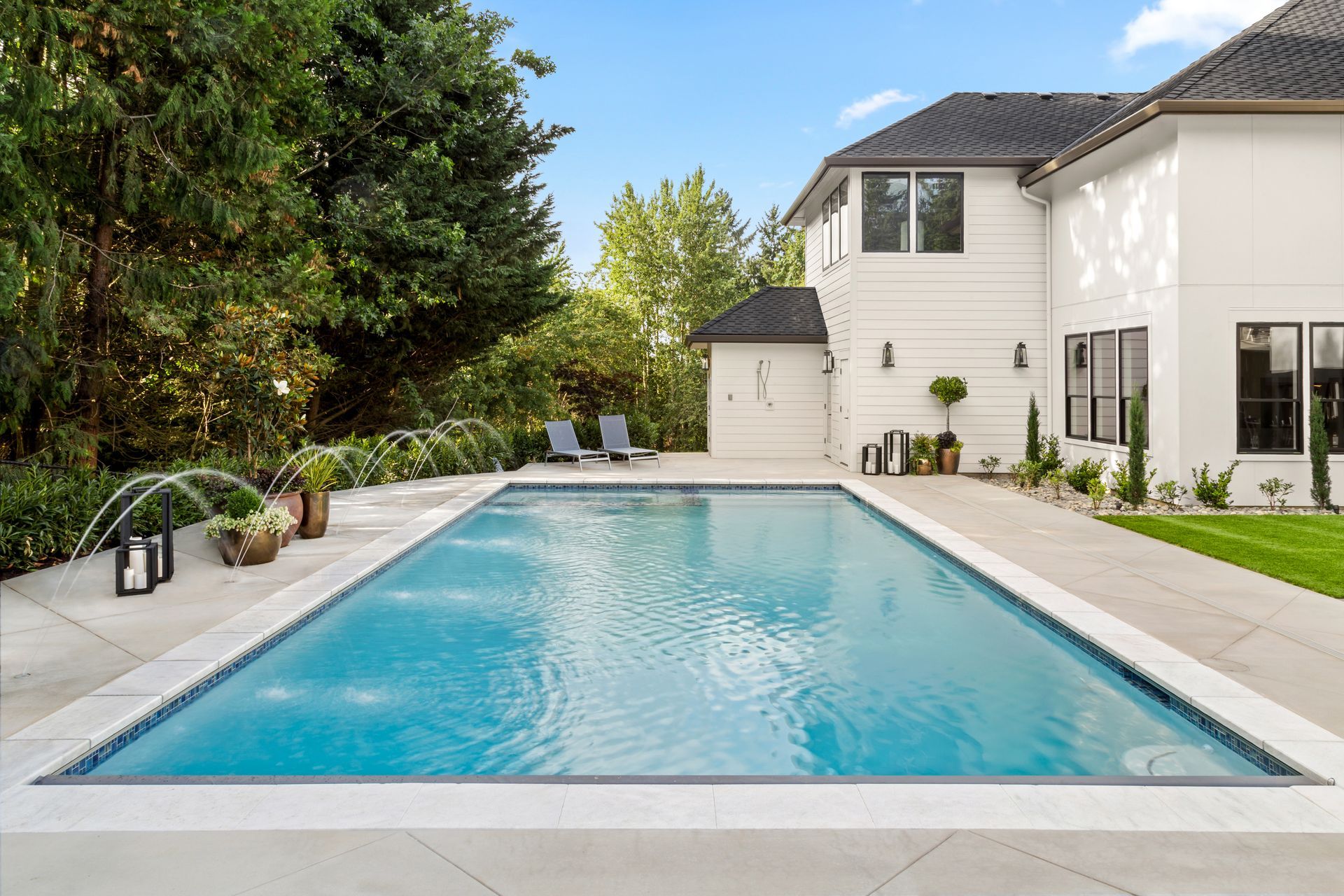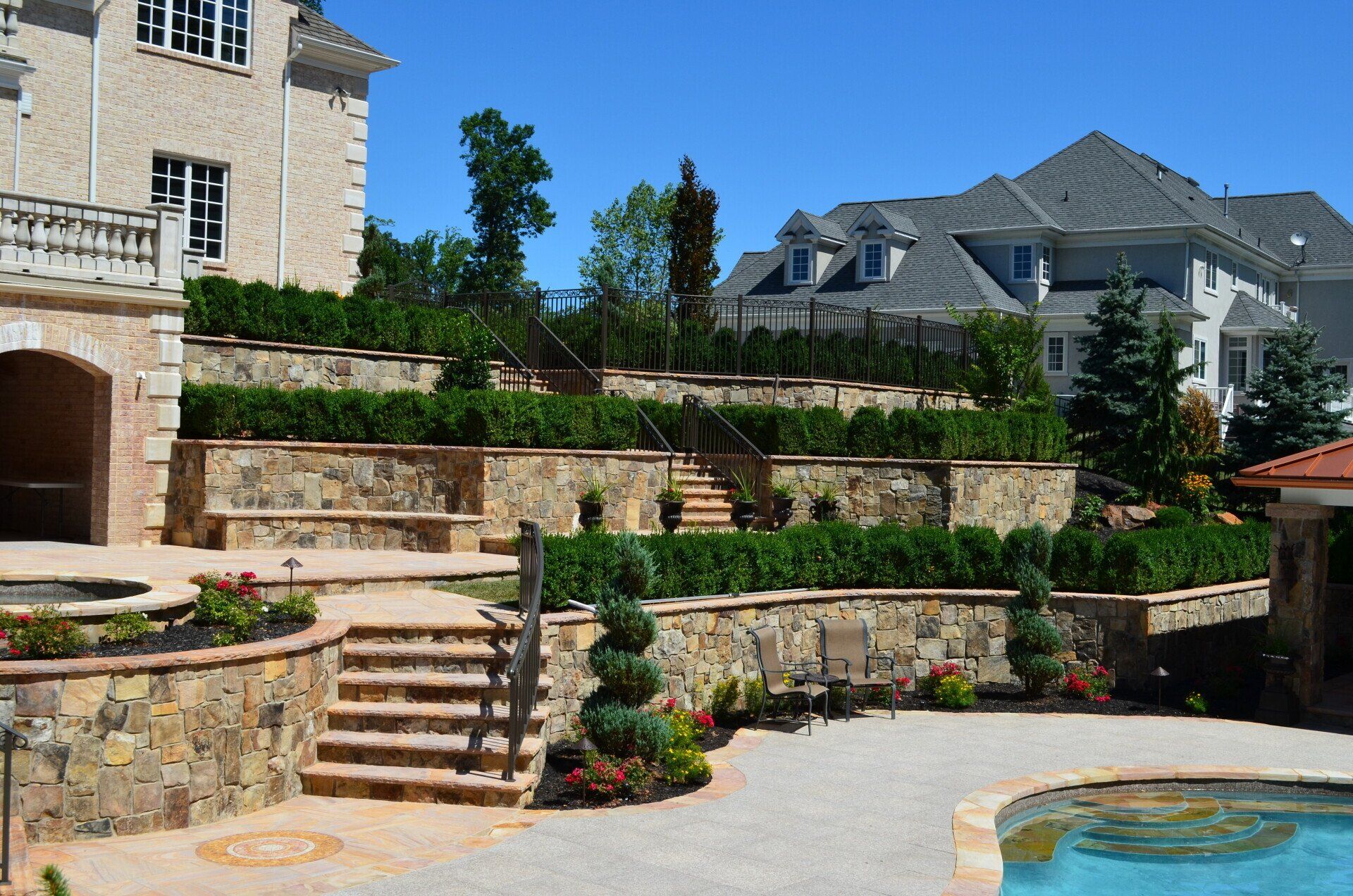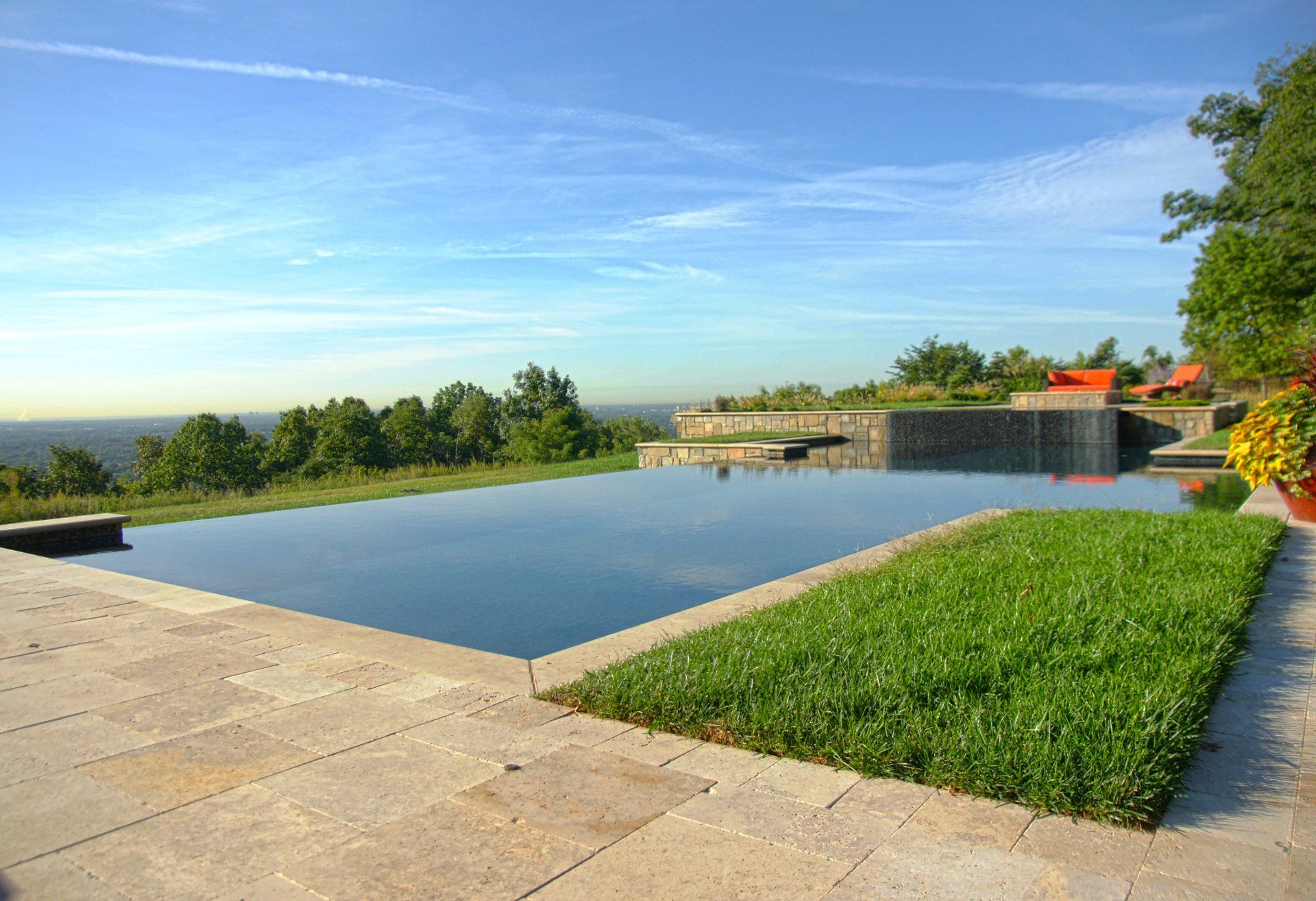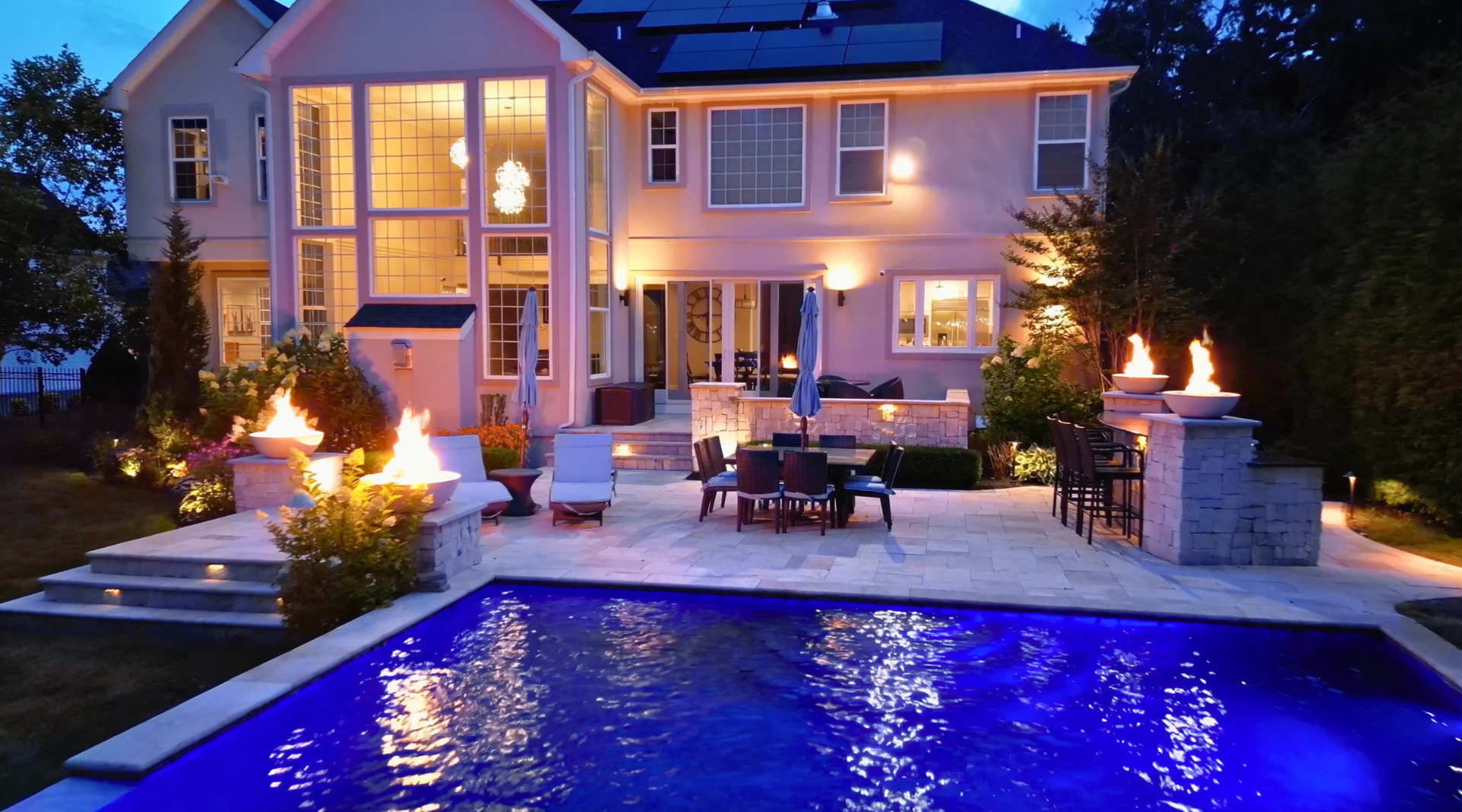Genesis Landscape Blog

When designing a swimming pool in New Jersey, selecting the right material is crucial due to the state's varied seasonal changes and weather conditions. From freezing winters to hot, humid summers, the material you choose must withstand various temperatures and environmental factors. This blog post will guide you through the best pool materials suited for New Jersey's climate, helping ensure your pool remains beautiful and durable for years. Concrete Pools Advantages Concrete is highly favored for its durability and versatility. It allows for nearly limitless shapes and sizes, making it ideal for custom-designed pools. Concrete pools can also be finished with plaster, paint, or special coatings like aggregate finishes, which add a visually appealing texture and are available in various colors. Considerations However, concrete is porous, so it can be susceptible to algae if not regularly maintained. It also requires a more extended installation period and might need more frequent resurfacing than other materials. In New Jersey's freeze-thaw climate, concrete pools must be carefully constructed with quality materials to prevent cracking. Vinyl Liner Pools Advantages Vinyl liner pools are a cost-effective option and offer a smooth surface that’s gentle on the feet. They come in various shapes and sizes, though they are somewhat limited compared to concrete. Vinyl liners can be easily replaced, giving your pool a fresh look without a complete overhaul. Considerations The main drawback is the liner's vulnerability to punctures and tears. In New Jersey, where yards may have more tree debris, ensuring the pool area is clear of sharp branches and rough play is avoided can help prolong the liner's life. Vinyl also tends to have a shorter lifespan than other materials, typically needing replacement every 5 to 9 years. Fiberglass Pools Advantages Fiberglass pools are known for their resilience and ease of maintenance. These pools are manufactured off-site and installed as a single piece, making installation quick and efficient—often just a few days. The smooth, non-porous surface of fiberglass prevents algae growth and reduces the chemicals needed for pool maintenance. Considerations The initial cost can be higher than that of vinyl but comparable to that of concrete. One limitation of fiberglass is its size and shape, as it is restricted to what can be transported by road to the site. Additionally, in New Jersey’s sometimes harsh winters, the ground shifting can cause problems if the pool isn’t correctly installed. Factors to Consider Weather Resistance The material should withstand freezing temperatures and potential thaw cycles without cracking or sustaining damage. Both concrete and high-quality fiberglass are suitable for this. Longevity and Maintenance Consider how much time and money you will invest in maintaining your pool. Fiberglass offers the lowest maintenance, while concrete, due to its porous nature, will require more. Budget Your budget will play a significant role in deciding which pool material to choose. Vinyl is the most cost-effective upfront, but fiberglass, although more expensive initially, may offer savings in the long run due to lower maintenance costs and more outstanding durability. Conclusion Selecting the suitable pool material for New Jersey's diverse weather involves balancing durability, maintenance needs, aesthetic preferences, and budget. Whether you choose concrete, vinyl, or fiberglass, each material offers unique benefits and challenges. It's advisable to consult with a professional pool installer who can provide detailed insights based on your specific landscape and usage needs. With the right choice, you can enjoy a beautiful and functional pool that complements your outdoor living space for many years.

Creating a beautiful pool landscape in New Jersey involves more than just planting a few flowers. It requires careful consideration of the climate, the available space, and how the area will be used. This guide explores various landscaping options, including plants and hardscaping features, that can enhance your pool area's overall aesthetics and functionality. Choose the Right Plants Native Plants Opt for native plants that thrive in New Jersey’s climate. Native species require less water and maintenance and are more resistant to local pests. Some great native plants include Purple Coneflower, Black-eyed Susan, and New Jersey Tea. These plants add beauty to your poolside and support local wildlife. Privacy Shrubs and Trees To add privacy around your pool, consider planting evergreen shrubs and trees. Eastern Red Cedar and American Holly can serve as excellent natural screens that stay lush year-round. Consider tall ornamental grasses like Switchgrass or Feather Reed Grass for a softer, less formal barrier. Colorful Perennials and Annuals Incorporate perennials and annuals to bring color and vibrancy to your poolside landscape. Daylilies, Lavender, and Salvia, offer long-lasting blooms and are tolerant to the heat from pool waters. For seasonal colors, add annuals like Marigolds and Petunias. Implement Hardscaping Elements Patios and Decking Choose materials for your patio or deck that complement both the style of your pool and your home. Natural stone, pavers, and composite materials are durable and can be laid in various patterns to add visual interest. Ensure the materials are slip-resistant to enhance safety around the pool area. Pathways Create pathways with stepping stones or decorative gravel that lead to and from the pool. This adds functionality and enhances the design by providing structure and directing traffic around the backyard space. Water Features Integrate water features such as fountains or waterfalls that blend with the pool. These features add a dynamic element to the pool area and the soothing sound of running water creates a calming atmosphere. Focus on Lighting Strategic Lighting Incorporate lighting to highlight landscaping features and to ensure the pool area is enjoyable even after the sun sets. Solar or LED lights can illuminate pathways, spotlight trees or architectural elements, and add a soft glow around the pool. Add Functional and Decorative Features Outdoor Seating Areas Create a lounge area with comfortable seating near the pool to provide a place for relaxation and socialization. Consider adding a pergola or gazebo for shaded seating options. Fire Pits Including a fire pit in your landscaping design can extend the usability of your pool area into the cooler months. Choose a style that complements the surrounding landscape and provides a warm gathering spot for evenings outdoors. Sculptures and Art Pieces Decorative sculptures or art pieces can serve as focal points in landscaping, reflecting personal style and adding character to the pool area. Consider the Practical Aspects Maintenance When planning your landscape, consider the level of maintenance required. Opt for low-maintenance options that won’t take away from your time enjoying the pool. Safety Ensure all landscaping features, especially hardscaping around the pool, are safe and meet local regulations. Avoid planting trees too close to the pool to reduce debris and maintain clear sight lines for safety. By carefully selecting plants and incorporating thoughtful hardscaping and decorative elements, you can create a poolside paradise that enhances the beauty and functionality of your outdoor living space in New Jersey. Whether you want a vibrant floral display or a serene garden retreat, these landscaping ideas can help you achieve the perfect complement to your pool. Working With Genesis Pools & Landscaping For those seeking professional assistance with their poolside landscaping, consider hiring Genesis Pools & Landscaping . With decades of experience designing and implementing pool landscapes in New Jersey, Genesis Pools & Landscaping offers personalized services that cater to each homeowner's unique needs and preferences. Our landscaping experts can help you select the right plants, design effective hardscaping, and ensure that every element of your outdoor space is harmonious and functional. By choosing Genesis Pools & Landscaping, you can relax knowing that your pool area will be beautifully transformed with high-quality materials and craftsmanship, all tailored to enhance your outdoor living experience.

Renovating your swimming pool can transform your backyard into a stunning oasis that boosts your home’s value and enhances your enjoyment of the outdoors during those warm New Jersey summers. If you’re considering giving your old pool a fresh look, here are some tips to guide you through updating it to modern standards and aesthetics. Assess Your Current Pool Start by evaluating your pool's current state. Look for signs of wear, such as cracks, leaks, or outdated equipment. This assessment will help you determine the scope of your renovation. It might be helpful to consult with a professional pool inspector or contractor who can provide detailed insights and identify areas that need critical attention. Modernize the Pool Design Resurfacing and Re-tiling One of the most impactful changes you can make to your pool is resurfacing. New materials such as pebble-based finishes can offer both durability and a refreshing new look. Re-tiling the pool with modern, geometric tiles or glass mosaics can also dramatically change its appearance and feel. Edge and Shape Redesign Consider altering your pool's shape or edges for a more contemporary look. Infinity edges or knife-edge pools are popular and can give your pool a luxurious, modern feel. Adding steps or ledges can also modernize the design and improve accessibility. Upgrade Pool Technology Efficient Equipment Upgrade to energy-efficient pumps, heaters, and filtration systems to reduce energy costs and enhance the pool’s functionality. Automated pool covers can also be installed to keep your pool clean and safe when not in use. Smart Pool Features Incorporating smart technology allows you to control lighting, temperature, and even cleaning systems remotely via smartphone apps. LED lighting can also add a pop of color and ambiance to your pool area during night swims. Enhance the Surrounding Area Decking and Landscaping Revamping the area around your pool is essential. Consider new decking materials like natural stone or composite decking, which are stylish and durable. Integrating landscaping, such as planting trees, shrubs, and flowers, can enhance the natural beauty of your pool area. Outdoor Living Features Adding features like an outdoor kitchen, a fire pit, or a lounge area can create a multifunctional space that extends your home's living space to the outdoors. These features make your pool area more inviting and perfect for entertainment. Eco-Friendly Options Solar Heating Installing solar panels to heat your pool can be environmentally friendly and cost-effective. Solar heating systems extend your swimming season without the high energy costs associated with traditional heaters. Saltwater Systems Consider converting your chlorine pool to a saltwater system for a more natural feel and less maintenance. Saltwater systems are gentler on the skin and eyes and can be more economical over the long term. Plan Your Renovation Before you begin your renovation, make sure to plan thoroughly. Obtain the necessary permits, and choose the right time of year to begin construction so your pool will be ready by summer. Ensure you have a clear budget and consider working with a professional pool renovation company that can bring your vision to life with expertise and efficiency. By updating your pool with modern features and aesthetics, you increase the enjoyment of your outdoor space and add significant value to your property. Whether for subtle upgrades or a complete overhaul, a renovated pool can become a refreshing retreat in your backyard.

These days, the number of clients looking for expert and reputable East Brunswick, NJ pool installation companies has increased. The demand for pools has gone up, as many property owners are starting to see the benefits of having a pool at home. The industry has grown quite a bit over the past few years and you can now easily shop for pools from many professional pool installation companies. Platforms such as the internet have introduced new approaches to finding pool installation companies with just the click of a button. There is no doubt that the industry is now awash with many professionals and companies with different levels of expertise and knowledge. However, with a rapidly developing industry, there also comes the risk of dealing with those who may claim to be reputable pool installation firms, yet are not. To avoid falling into the trap of dealing with a company that is not a professional one, it is always a good idea to do careful research. One of the best ways to identify reputable companies is to know what qualities are associated with professional and reputable pool installation companies. By using information such as this, you can easily and quickly differentiate the different levels of professionalism in the industry. Let’s take a look at some of the key qualities and characteristics that are associated with reputable service providers. Licensing One of the easiest ways to identify a professional pool installation East Brunswick, NJ company is to verify whether the company has been registered. Just like any other industry, a pool installation is highly regulated to ensure quality and safety standards are maintained across the board. Before any pool installer is allowed to operate, they first must be registered and be cleared by the relevant authorities. This is an excellent way of ridding the industry of fake companies who want to disguise themselves as professionals. In addition, companies that are licensed operate under laid down procedures and conform to a strict code of conduct to ensure professionalism is maintained. In the event you do come across a pool installer who is unable to prove they are licensed, do not do business with them. Fortunately, it is easy to independently obtain information about a company’s license status. This way, you can be assured that the information you come across is credible. Timely Communication Good communication is extremely important for pool installers. Because you are investing your hard-earned money in a large investment, it is good to check for a professional whose communication capabilities meet your expectations. As long as you are doing business with an established company you can be assured their communication skills will be good. Before a pool installation begins, a lot of correspondence is necessary between you and the pool installer in order to sort out a couple of issues. For this reason, you need to hire someone who responds quickly and is available for any engagement relating to how your pool project plans will be implemented. If you want information about how well East Brunswick, NJ pool installation providers communicate with their clients, you can begin by checking various company reviews. This will give you a good idea as to which companies you should pick for your project. Good communication entails simple things such as a quick response to emails and telephone calls, clearly informing the client what is expected of them, and offering useful information about pool installations. Adherence to Timelines It is important for all service providers in the pool installation industry to do their work within stipulated timelines. A contractor who fails to respect project timelines is considered unprofessional. Therefore, when looking for a pool installer company, it is good to focus your research on trying to determine how well they deal with project implementation timelines. This information can be easily obtained by examining reviews and contacting previous clients to check to see if the company respects deadlines. When you deal with pool installation in East Brunswick, NJ companies that work within the agreed timelines, you have can be assured of good workmanship and sufficient budget provision. Good Workmanship This is perhaps one of the most crucial qualities that any pool installer must have. The consequences of poor workmanship are dire as you end up wasting your money on a project that is of poor quality and fails to meet your expectations. Building a pool is an expensive investment and you need to ensure that whoever is building your pool has an excellent record of quality assurance. Fortunately, because of increasing competition in the industry, a majority of East Brunswick, NJ pool installation firms have managed to maintain high-quality pool building standards. In this era of cut-throat competition, industry players understand there can be no room for mistakes. These are some of the main characteristics you should look for in any prospective pool installer. As long as you work with a company that meets the above requirements, you will definitely be happy with the end result.
A New Jersey pool installation is one of the best investments you can make for your property. In this day and age, property owners are beginning to value the importance of having a pool nearby for convenience. Unlike the past where pools were commonly found as public amenities, you can now find several homes that are already installed with pools. A pool installation requires a significant amount of investment, and therefore it’s good to plan your finances for one well in advance. To get the best value from your investment, it is important to ensure you use the right procedures so no pool installation stage is compromised. There are cases where property owners have been disappointed with their pools because they fail to meet their expectations. If you want to have the best pool, you first need to know what the qualities of a good pool are. Unfortunately, many of us proceed to invest in a pool without knowing what the final outcome should be. Remember, it’s not just about having a pool, but rather directly feeling the benefits of your investment. Aside from having a seasoned service provider handling your project, it makes sense to research and determine the qualities of a good pool. When you have this information, it will become easier for you to know what you want to achieve by the end of the pool installation project. So, what are some of the main qualities of a good pool? Safety Even though pools offer us a chance to rejuvenate, relax, and have fun, sometimes unfortunate accidents can occur in a pool. For this reason, before you embark on installing a pool, it is important to ensure that the pool meets the highest standards of safety. Choosing a reputable pool installer in New Jersey guarantees that they will construct a good pool that will take into account all safety considerations. Safety features need to be considered right at the beginning of the design and construction phase. Having a well-designed pool with the latest safety features will allow you and your family, and anyone else who uses your pool, to be safeguarded against pool accidents. Working with a seasoned professional is important as they have sufficient experience and can therefore advise and incorporate relevant pool safety features. Pools such as kid pools must be installed with all possible safety features to ensure children can enjoy the pool without being exposed to risks. This doesn’t just apply to children’s pools though. Adult pools should also conform to all possible safety requirements. Durability We usually want to invest our money in things that we can reap the benefits from. Investing in a pool isn’t a cheap affair, but it’s always good to ensure you install a high-quality pool. The durability of a pool begins with the acquisition of the right quality of materials as well as trained personnel to handle the pool construction process. When you have a durable pool, you will spend less time on maintenance and instead focus on having fun in your pool. A durable pool also upholds safety standards ensuring that users have fun in a safe environment. As long as you work with a credible and reputable New Jersey pool installation professional, you can be assured that your pool will meet quality assurance standards. Maintenance While it is fun to own a pool, there are some associated costs and expenses that you have to take into consideration. A good pool should be easy to maintain in terms of costs and maintenance. When looking for a pool to install, always discuss your maintenance expectations with your provider in order for them to advise you on the best pool to select. Different types of pools have various maintenance implications and therefore you need to make sure to have this information ahead of time before making a decision. Custom and high-end pools are known to be more expensive to maintain. If you decide to go for high-end and sophisticated pools, you should be prepared to spend more on their maintenance. Splendid Location The location of your pool determines how you will use and enjoy this facility. Property owners are always advised to think carefully and make good decisions regarding the location of their pool. You might have a good pool but if it was constructed in a bad location, it will lower your satisfaction. According to New Jersey pool installation experts, a pool should be located in a central area where it can be easily accessed from different parts of the house. So as long as you are satisfied with the location of your pool, you will always enjoy your pool experience. The qualities listed above are some of the main things you should look for and keep in mind when working with a pool installation New Jersey professional. As long as a pool meets the above requirements, it will work to serve its full purpose.




